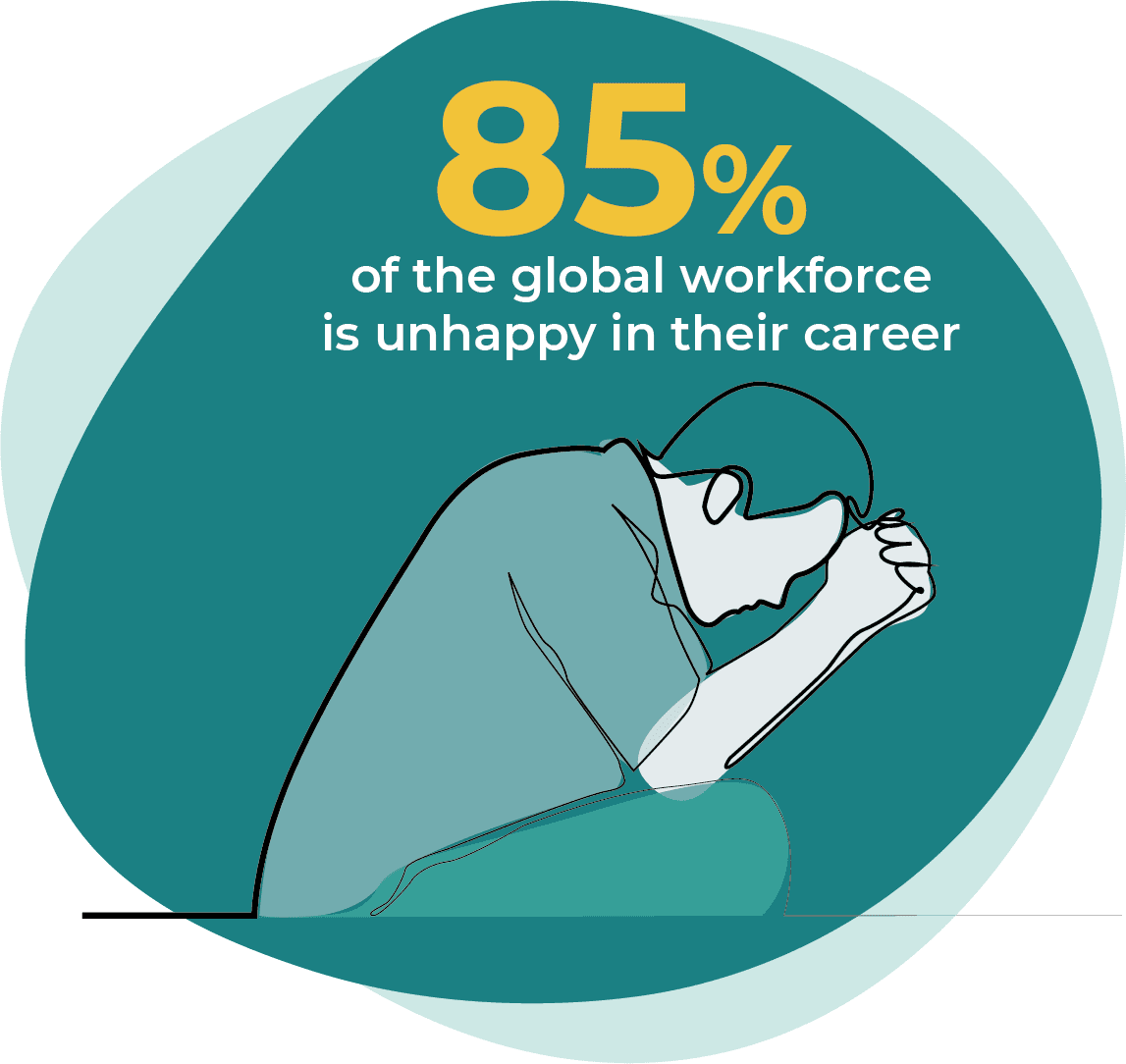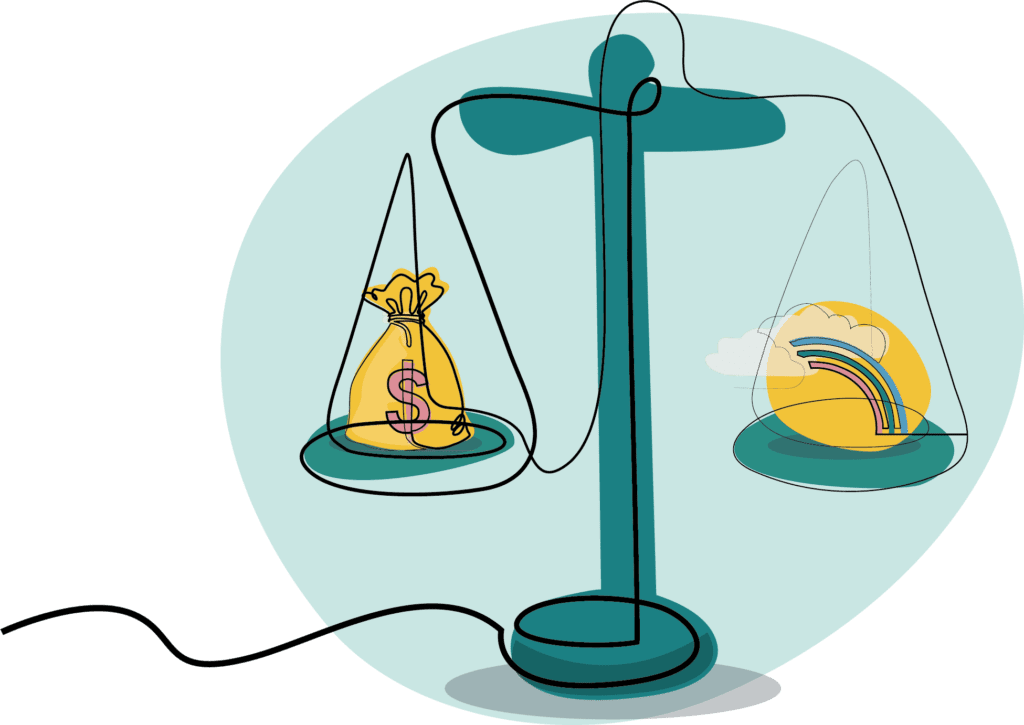Stephanie Dotto
We all reach that point in our lives when we start to wonder whether or not our jobs make us happy. Considering how much of your time is spent working, it makes sense to pursue a career that leaves you feeling fulfilled. But how practical is it, really, to prioritise happiness?
The sad reality is that most jobs that make us feel good tend to pay less money. Anyone who works in the charity sector can tell you that—but they’ll also tell you that the personal satisfaction they get from a job fuelled by passion far outweighs any hits they took financially.
Of course, that doesn’t mean that you need to earn less money to be happy. Rather, you just need to strike a balance between the work you enjoy and the jobs that pay the bills—at least in the beginning.
Remember, money and happiness aren’t mutually exclusive

Did you know that 85% of the global workforce is unhappy in their career? When we first step into the working world, we’re trained to believe that money equals success and success equals happiness. But anyone who’s faced a 60-hour work week and teetered on the brink of burnout can tell you that a huge salary isn’t always worth it when your mental and physical health and your personal relationships are sacrificed.
In reality, success is determined by how happy we feel in the work that we’re doing. According to the World Economic Forum, happy people are less likely to burn out and tend to report higher levels of productivity because they enjoy the work they’re doing. This can in turn lead to more success and income. Those benefits spill out into their personal lives as well, meaning their overall satisfaction levels exceed that of someone who works long, hard hours for a highly-paid job they don’t enjoy doing.
However, we can’t all simply quit our jobs and work for pennies doing what we love. We have financial commitments and lifestyle aspirations too. So how can you build a portfolio career that makes you happy while still maintaining a positive financial income?
It’s all about creating professional equilibrium
Many people shift into portfolio work because they want to be in control of their career, and, by extension, their happiness. When you work as a freelancer, independent contractor or entrepreneur, you’re the one shaping the trajectory of your professional future. You have the freedom to pursue your passions and do the work you love. So don’t let financial pressures stifle the enthusiasm that drove you to go solo in the first place.

It’s easy to prioritise high paying client work over passion projects when you don’t want your income to dip, but remember to never lose sight of the things you enjoy doing. It’s all part of a larger balancing act; one that allows you to maintain personal and financial stability by splitting your workload between fulfilling projects and the ones that pay the bills. That way, you have the flexibility to do what you love and still earn an income, all while building up a specialised portfolio. Eventually, you’ll be in a better position to turn the jobs that make you happy into your sole source of income.
If you want to grow your passion projects and increase the amount of money they bring in, it helps to:
- Develop and grow your skills wherever you can—Find out what it takes to make your side hustle successful and continue to learn and adapt along the way. The more expertise you have, the more you can charge for that service.
- Chronicle your journey and share it with whoever will listen—This could be a blog, a podcast or even a series of videos on YouTube. Not only will you be inspired by your own development, but you will build better connections with a community of people who may one day become your clients or collaborators.
- Dedicate a set amount of time to the projects you enjoy every week—Even if you’re not making a lot of money off these jobs in the beginning, do them because they make you happy.
Turning your passions into a full time career
For many, the idea of having a career that keeps you happy and sustains your livelihood can feel like an unattainable dream, but just think of all the people who tried and succeeded in building astounding businesses out of a side hustle. Before Humans of New York was a viral phenomenon and best-selling series of books, it was a passion project for bond trader Brandon Stanton who wanted to make the shift into photography. Joel Gascoigne was a freelance web developer when he started Buffer, which is now used by over 75,000 companies worldwide.
In other words, it’s entirely possible. You just need to put the time and effort into creating something that makes you happy and benefits others along the way. It is almost always the case that if you make other people’s lives better in some way, there is the potential to make money from it at some stage.

So sit down and strategise what you really want to achieve out of your portfolio career. It helps to determine:
- What the market you want to break into looks like
- How you can incorporate your passion projects into your current offerings
- What percentage of income you intend those projects to bring in (and how you’d like that to change over time)
- How much you need to earn to keep your passion projects running
- Who you can learn from—consider finding a mentor or joining an online community to connect with other people who have embarked on this journey
Then sketch out a timeline for how long it might take to financially sustain yourself doing the work you love full time. Every few months, evaluate how you’re progressing—and don’t forget to celebrate the wins along the way!
Building a portfolio career that inspires you every day
In the beginning, it’s all about testing the waters and growing your portfolio. Do the jobs you know will keep you financially comfortable, but make time for building up the side hustles you’re truly passionate about. The more experience you get, the more you can charge for your services and prioritise the work that makes you happy down the line.
Think this sounds like the right path for you? Come along to our monthly Community Welcome Call for new members to find out what a portfolio career could look like and how The Portfolio Collective can help you take those first steps towards professional success – and don’t forget to connect with our community!




